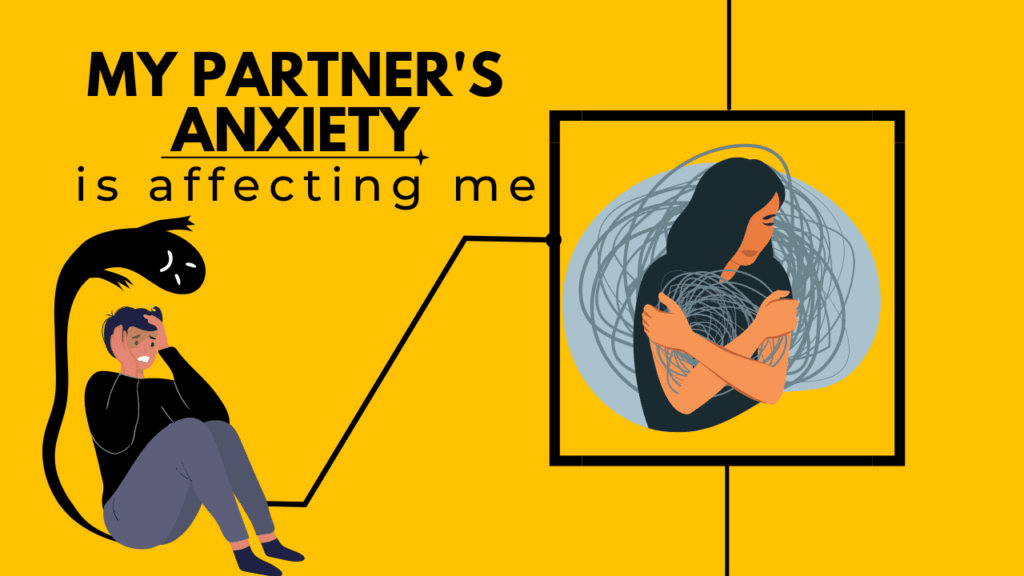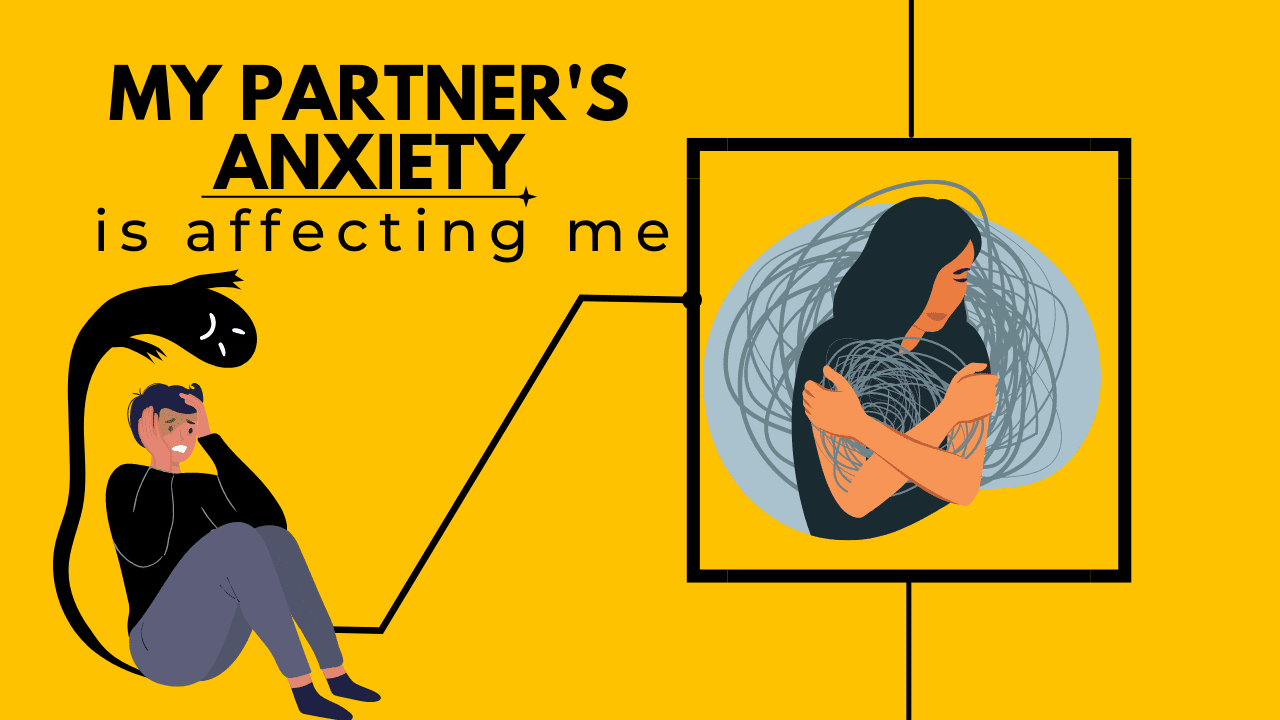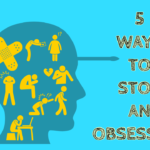Is your partner’s anxiety affecting you emotionally and making it difficult for you to enjoy life and resolve your problems? If it is, you’re not the only one. Many if not most people get affected by their partner’s stress, anxiety, worries, and depression.
They care about their partner, so they feel worried and overwhelmed by their partner’s anxiety and problems. They wish their partner didn’t feel as anxious as he or she does and that they wouldn’t get so affected by it.
Their partner’s pain is their pain. And there’s only so much pain they’re able or willing to endure before it affects them emotionally, hinders their quality of life, and changes their perception of their partner and behavior toward their partner.
People don’t have unlimited patience, self-control, and perseverance. They may absorb some pain, but eventually, the pain gets to them. It especially gets to them if their partner directly or indirectly causes them to suffer and makes them feel responsible for dealing with his or her problems and pain on top of theirs.
Anxiety can overwhelm them mentally and emotionally and make them start thinking they’re unhappy and that they don’t want to feel that way because of their partner. If nothing changes, they may also start avoiding their partner, get into an argument, and lose feelings for their partner.
Hence, many people wish their anxious partner would do something about his/her problems and that he or she would cope better with anxiety. Their partner’s mental health affects them deeply, so they don’t want their partner to keep making his or her problems their problems.
At some point, they expect their partner to become emotionally stronger and take control of his or her life. They expect their partner to develop effective stress relief strategies and stop hurting them.
They’re not unreasonable for not wanting to suffer with their partner.
Pain is a sign that something isn’t right and needs to change. A person either needs to accept pain and let it pass or develop coping mechanisms and not let it affect him or her and others.
Your partner should deal with anxiety and avoid dragging you down with him or her.
It sounds mean, but people care and get affected by their partner’s suffering. Initially, they want to help. But when the same problems repeat over and over again and their partner handles problems the same way again and again, they get overwhelmed and tired of helping.
They get tired and prioritize their well-being over their partner’s.
This tends to happen to people who have their own issues to deal with and feel that they can’t help themselves and their partner at the same time. Such people often lose their patience and appear uncaring to their partner.
All they want is to deal with their problems and/or rely on their partner back. Because they can’t rely on an anxious partner, they depend on themselves for their problems and consider their partner unreliable.
The longer they think that way of their partner, the bigger the chance that they fall out of love and want to be with someone who can support them back once in a while.
That’s why it’s extremely important to take care of your mental health and problems. You don’t want to overwhelm your partner with your difficulties and responsibilities and show him or her that you don’t care about his or her problems and feelings.
Although partners are supposed to be supportive and stick with each other through thick and thin, they shouldn’t be taking care of each other’s basic responsibilities and anxiety every day. Not unless they have mental health problems and need understanding and care.
As developed romantic partners, you must rely on each other but not over-rely. If someone over-depends on the other, chances are he or she will feel swamped by negative emotions and think of his or her partner as high maintenance.
In a relationship, you need to constantly work on minimizing or eliminating things that ruin your (mental) health. Things such as addictions, bad habits, anxiety, and depression overwhelm you and others. They cause people to feel stressed and make them lose feelings.
When that happens, they leave their partner and feel relieved and empowered. They feel they can finally focus only on themselves and feel the emotions they want to feel.
I often warn people that they shouldn’t get into a relationship if they feel depressed, lonely, anxious, scared, or afraid. If they enter a relationship with unresolved issues just to take from the relationship, they often become a self-fulfilling prophecy.
They make their partner detach and lose interest in them. That’s when they suffer from heartbreak and have multiple things to work on.
You’d be surprised how many people leave their depressed partner. They think their partner will continue to make them feel miserable, so they fall out of love and think, feel, and do what they want.
Such people think their ex held them back from being happy and reaching their full potential.
Is it morally acceptable to leave your depressed partner?
No. It’s not okay to leave your partner whether your partner was depressed before you got together or became depressed after. Depression is a mood disorder that people don’t choose to have. It usually happens to them after a stressful life event.
Most people just need a bit of understanding and support to deal with depression.
You wouldn’t want to get dumped when you’re going through one of the most challenging periods of your life either. You’d expect the person you love to listen and help. It’s one of the reasons you chose your partner.
That doesn’t mean you should constantly rely on him or her for your stressors though. Your partner isn’t a magic sponge. There’s only so much he or she can absorb before your anxiety affects him or her.
If you want what’s best for you and your partner, you should find ways to release your frustrations without affecting your partner. Start journaling, sign up for therapy, see a doctor, take antidepressants, exercise, change your lifestyle, and do what you can to feel less anxious.
If you feel in control of your emotions, your partner will feel in control also and find it easier to bond with you.
So if your partner’s anxiety is affecting you and you don’t know how not to get affected, bear in mind that you’ll both have to make some changes. You’ll have to accept your responsibilities as a partner and help your partner when needed whereas your partner will have to work on feeling less anxious.
He or she will have to find ways to relieve anxiety and avoid indirectly damaging the relationship.
In this post, we talk about why your partner’s anxiety is affecting you and how you can not get affected so much.


Why is my partner’s anxiety affecting me?
Your partner’s anxiety is affecting you because you care. You want the best for your partner and don’t want him or her to feel sad, anxious, and stressed. When your partner is anxious, you want anxiety to quickly go away so you can focus on positive things or things you need to take care of.
Because you can’t get rid of the problem for your partner, you feel stuck and stressed and don’t know what to do. On the one hand, you want to help, but on the other, you want to do the things you want to do.
That makes you feel pressured and anxious at the same time—which is a recipe for emotional overwhelm and a loss of feelings. If you don’t understand why your partner’s anxiety is affecting you and what you can do about it, there’s a decent chance you’ll disconnect from your partner and leave before your partner stops feeling anxious.
So bear in mind that your partner’s emotional state is affecting you because you’re used to being around your partner and have seen your partner anxious many times. Due to recurring problems and anxiety, you became less patient and tolerant of your partner’s problems and aren’t afraid of showing your partner how you react to stressors.
In other words, your partner’s anxiety brings out the worst in you. It reveals how you perceive your partner when he or she is emotional and how likely you are to help.
Typically, men get overwhelmed more than women. They’re fixers in nature, so they think they must solve their partner’s problems for them. In reality, all their partner wants is someone who listens and cares; someone who empathizes with them and reassures them.
Since they aren’t used to strong emotional responses, they often get stressed and overwhelmed when their partner feels anxious and fails to break her triggers.
Whether you’re a man, a woman, or something in between, your partner’s anxiety affects you because you have enough problems of your own and don’t want to worry about your partner’s problems as well. You want your partner to be as successful in handling emotions as you.
Because he or she isn’t, you feel pressured to help your partner and feel that nothing you say or do helps. You’re forgetting that your partner feels much worse than you and that your partner needs you now more than ever.
Sometimes your partner needs more help and other times, you need more help. Relationships are never completely balanced in this regard because someone always has better coping mechanisms and support systems.
Someone is also more emotional and expressive (usually the woman).
That’s why partners must be understanding of each other’s differences (especially when it comes to emotional strength) and accept each other’s weaknesses. If they can do that, they don’t get affected by each other’s problems and anxiety to the point where they consider breaking up.
Therefore, your partner isn’t solely responsible for fixing his or her anxiety problems. You must also be empathetic when needed and do your best to make your partner feel loved. If you understand your role, your partner probably won’t feel anxious for long.
He or she will soon get rid of intrusive thoughts, process unwanted emotions, and return to normal. Anxiety will probably return in the future. But with proper anxiety-managing techniques, you’ll be able to deal with it better.
With that said, here’s why your partner’s anxiety is affecting you.


How to not get affected by your partner’s anxiety?
I’m not saying it’s entirely your fault you get affected by your partner’s anxiety. But there’s a lot you can do to not get affected to the point where you feel tempted to react negatively.
If you accept your partner, value your partner, and see how your partner’s emotional side contributes to your life, you can be patient and supportive when your partner needs you to be.
The more important your partner is to you, the more grateful you’ll feel and the less your partner’s anxiety will bother you. Gratitude and understanding are essential. They can prevent you from taking your partner’s anxiety personally and making you respond instinctually.
An instinctual response to your partner’s anxiety will likely make your partner feel uncared for and make his or her anxiety worse. In retaliation, your partner will then probably say hurtful things, cause a fight, and make the relationship seem unsalvageable.
If you don’t want things to end, you need to keep in mind that your partner is going through a lot and that you need to watch your words and actions. You need to be gentler with your partner than ever before and let him or her know how you feel when he or she is anxious.
Say that it affects you emotionally and that you have a hard time focusing on things because of it. Your partner might take that personally, so choose your words carefully. State that you don’t want to cause any problems but that you’ve been feeling stressed recently too and that you don’t want it to affect the relationship.
Your partner will probably understand where you’re coming from and be open to discussions. You won’t know what your partner thinks and does unless you approach your partner respectfully and show you have his or her best interests at heart.
So make sure to talk about your partner’s mental health, things that trigger him or her, and the way it affects you. Your partner deserves and needs to know that you have feelings too and that you need to both do your best to support each other.
Don’t expect your partner to fix everything on his or her own. If you make your partner feel ignored and alone, you’ll increase his or her anxiety and feel even worse when your partner calls you out for your passiveness and neglect.
To not get affected by your partner:
- tell your partner you’re on his/her side and that you want to help
- express how important the relationship is and reaffirm your commitment to the relationship
- say everyone goes through difficulties and that partners support each other
- make sure your partner knows that his/her anxiety affects you too
- let your partner know how it makes you feel and that you want to get through difficult times together
- ask your partner what he/she needs from you to not feel stressed
- create plans on how you’ll both deal with anxiety when it arises
Communication is key. The more empathetic you sound, the more your partner will appreciate you and care about your feelings. Your partner will see that you’re not trying to cause problems and that you just want the relationship to be healthy.
So bear in mind that your partner deals with emotions differently from you and that he or she needs you to adapt. Your partner needs an encouraging and reassuring partner who understands mental health and can be relied on in times of need.
If you’re the right person for your partner, you should both make some changes and be there for each other. Talk to each other, offer help, and ask for help. Couples who overcome difficulties together bond and feel a sense of belonging and accomplishment.
They stay together because they understand each other’s importance and feel connected.
Conversely, couples who ignore anxiety and blame each other for how they feel usually break up. They get affected by each other’s problems, stressors, anxiety, or depression and leave when doing so becomes convenient for them.
If you don’t want that to happen, learn to express yourself properly and work on your patience, self-awareness, and perception of your partner. Make self-development a priority and help your partner deal with anxiety.
What if my partner’s anxiety doesn’t get better and I keep getting hurt?
If your partner’s anxiety makes his or her mood swings uncontrollable even though you’re doing everything in your power to help, I urge you to give your partner at least a few months before you make any drastic decisions.
Encourage your partner to sign up for therapy and get the help he or she needs. If your partner acknowledges his or her problems and seeks help, your partner will probably eventually stop feeling uncontrollably anxious and be the partner you want him or her to be.
Your partner will have more (positive) energy to share with you. So don’t quit on your partner (especially a long-term one) if your partner recently went through something difficult. Don’t do it even if nothing stressful or painful happened.
Sooner than later, you’ll feel down too. And when you do, you’ll expect your partner to understand you and support you. You’ll need him or her to return the favor and get you back on your feet.
That’s what partners do. They help each other emotionally, physically, and financially. Relationships aren’t all rainbows and sunshine. They have challenging moments too: moments when their relationship skills, maturity, and empathy are put to the test.
So give your partner some time to get through the storm. I can’t say how long your partner needs to feel better and make you feel better in return, but give him or her at least a few months.
If you’ve been your partner for years, what’s a few months of waiting?
On the other hand, if you recently started seeing your partner, then 2 – 3 weeks of unhappiness should probably be enough to decide if you want to continue the relationship. If you’re not official and/or don’t have a strong bond yet, your relationship shouldn’t be so full of anxiety.
It should still be new and exciting. Unless something serious happened (someone passed away), you can tell that your partner doesn’t control stress very well and that you’ll keep getting affected by it. As long as you’re together, you can expect to feel stressed and unhappy.
In that case, it may be better to leave and find someone who controls anxiety better. A person who is better at dealing with difficult emotions will be easier to handle emotionally.
Is your partner’s anxiety affecting you? What is your partner doing that stresses you? Share your relationship problems in the comments below.
And if you’re looking for advice on your specific situation, subscribe to 1-on-1 coaching here.






I swear to god, the more I read this blog the more I see my ex in a different light.
I know the role I played in the breakup, I won’t deny that. But the fact that we had known eachother 4 years before becoming a couple. I have always been there for her, her kids, her cat and dog to a degree. Even more so during our relationship. When she had a crap day because of work or because of her kids behaving, I was there to listen and be with her. And when I had a 4-5 month stressful period due to work and other things she just kept pushing me until I told her I needed a time out from stressful things in my life. That’s when she did the old monkeybranch on me.
That’s when I realized all these years were probably worth less than garbage to her, since she threw it away so easily.
Hi Gordon.
It means you’re detaching and regaining personal power. You’re learning that your ex took you for granted and threw the relationship away. She expected help from you but wasn’t willing to help you back. That’s one-sided partnership that often leads to GIGS and cheating.
I wish you a fast recovery, Gordon.
Best,
Zan